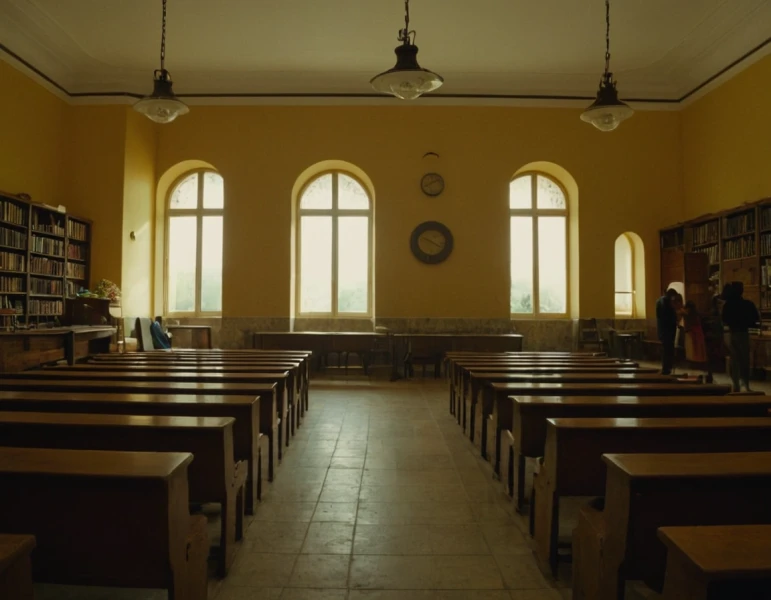Educa UNIVERSITY|EDUCATION
School of Education: The Story of Amadeo Perez and his Life Experience in Teacher Education.
Related Masters
School of Education: The Story of Amadeo Perez and his Life Experience in Teacher Education.
Hello, I am Amadeo Perez, a passionate of education and, throughout my life, I have had the opportunity to walk through the corridors of several Faculties of Education. Here I want to tell you, with a bit of nonchalance and a lot of knowledge, what a Faculty of Education means and why, if you are thinking of going into teaching, this is a place where true heroes are forged, although they often go unnoticed.
What is a Faculty of Education?

Let's start with the basics: a Faculty of Education is the university institution where future teachers are trained. Here, the teachers of the future acquire both theoretical knowledge and practical skills that allow them to face the challenges of teaching at all levels: from early childhood education to secondary education or even at the university level.
The interesting thing is that it is not just a matter of learning how to "teach". No, no! Being a teacher involves much more than standing in front of a group of students and spouting off a lesson. It involves understanding the social, emotional and psychological context of each student, and this is something that, when you start, you have no idea.
I remember my first day at the Faculty of Education. I entered with that romantic vision of "I want to change the world"-maybe you have it too-but over the years I discovered that changing the world starts with understanding it.
What Do You Learn in the Faculty of Education?
In a Faculty of Education they teach you how to teach. It sounds simple, right? But it's not. To be a good teacher, you need to master three fundamental areas:
Pedagogical knowledge: This is where you learn the theories of education. Vygotsky, Piaget, Freire... all those names that at first sound like "homework to be done" to you, but later become the basis of your teaching method. These theorists explain the how and the why of education. For example, Vygotsky says that learning is a social process. Of course! The famous collaborative learning that surely sounds more familiar to you in our days of Zoom and Google Meet classes.
Didactic skills: Being a teacher is not only knowing the theory, but also having effective techniques to transmit that knowledge. Education faculties today combine theory and practice very effectively, and invite you to experiment in real situations so that, when you face a classroom full of students, your voice does not tremble.
Reflective skills: One of the keys I learned at the Faculty of Education of the PUCP (yes, my alma mater), is the importance of constant reflection. Teaching is a constantly evolving profession, so it is essential that the teacher not only teaches, but also learns from his or her own practice.
And here is a secret that I learned over the years: The capacity of a good teacher is not only in what he knows, but in how he can constantly transform himself.
Research: A Key Pillar
It is not only about teaching, but about research. Faculty not only train future teachers to be able to teach, but also train them to contribute to the development of new pedagogical methods. Universities, such as the Pontificia Universidad Católica del Perú, encourage educational research as a key tool for improving teaching processes. Here, students are encouraged to reflect on their practice from studies and research that they themselves conduct,
The Reality of Teaching: Not Everything is Pink
Let me tell you something. I, Amadeo Perez, lived it. Teaching is not easy. When you are in a faculty of education, everything seems perfect: "This is the ideal technique to capture students' attention," "this is the way you will get everyone to learn". But when you get to the classroom, you find a group of students who, for example, barely want to pay attention. And that's just one of the challenges! Every student is a world and, as a teacher, you have to figure out how you can connect with that world.
This is where the concept of experience makes sense. In a College of Education, we are taught to value our experiences as fundamental tools to improve our practice. Every class you teach is an opportunity to learn and improve, and I guarantee that, at the end of each day, you will have more questions than answers, but that is precisely the magic of this profession.
Why Choose a College of Education?
If you are reading this it is because you probably feel that vocation within you. Something tells you that teaching is your thing. And let me tell you, if that's what you feel, follow that instinct. Teaching is a career that will take you places you never imagined. I have been fortunate to see my students grow up, become adults, and more than repay me for everything I once gave them. Is there any better reward than that?
Also, Faculties of Education today are prepared to face the challenges of the 21st century: diversity in the classroom, new technologies, collaborative learning, and distance learning are just some of the challenges they address. It is not an easy road, but it is one filled with personal and professional satisfactions.
In Summary: Being a Teacher is a Path of Transformation
If my life in the College of Education has taught me anything, it is that teaching transforms you as much as you transform your students. So, if you are thinking about studying to become a teacher, do it! Society needs more people who want to change the world in the classroom.
Faculties
Trainings
The faculties embrace diverse academic disciplines and fields of study, opening doors to new perspectives and exploring different spheres of wisdom in a constantly evolving world.














